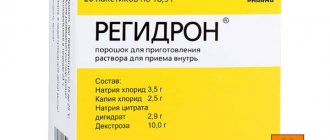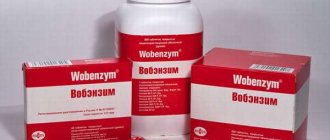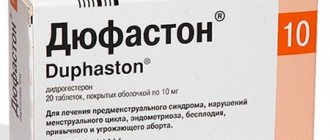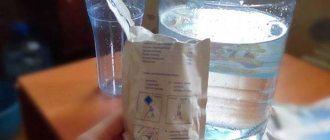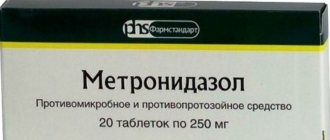Symptoms of herpes activation
There are no symptoms of herpes virus infection for some time.
There are people who have never seen herpes on their lips in their lives; they become hidden carriers of the infection. At the same time, the incubation period of the disease in typical cases ranges from 1 to 12 days. Activation of herpes in women occurs at the beginning of monthly bleeding. Under the influence of physiological processes occurring during menstruation, a woman’s body seems to provoke an infection. Before menstruation, herpes worsens, and the rash takes on an atypical appearance. Within a few days, itching and burning appear in places where ulcers further form. On bleeding days, bubbles with a colorless liquid inside are noticeable; over time, it darkens. After menstruation, the ulcers burst and a crust forms in their place.
Before menstruation, herpes manifests itself with pronounced symptoms; it is quite difficult to confuse it with other diseases. This is, oddly enough, a plus for a woman. After all, early diagnosis allows you to quickly begin treatment and reduce the time when a woman has an unaesthetic appearance.
Course of relapses
The course of the disease can vary in severity:
- Mild degree is characterized by rashes no more than 3 times a year.
- Moderate severity occurs 4 to 6 times a year.
- Severe severity occurs almost monthly.
The course of the disease may vary:
- Monotonous course of the disease. In this case, relapses appear very often and are equal in time to the period of remission. Menstrual herpes just belongs to this type. Every month it worsens and is difficult to treat.
- The arrhythmic course of the disease, in which days of improvement and days of exacerbation of herpes periodically alternate. The period of weakening of the disease lasts from several weeks to several months. The longer the period of remission lasts, the longer and more severe the period of exacerbation of herpetic infection passes.
- The subsiding type is the most favorable course of the disease. The time of remission increases, and the severity and duration of exacerbation decreases.
The mechanism of manifestation of herpes
For a long time, herpes remains in the human body in a “sleepy” state. He patiently waits for the moment when a person’s defense system fails, and then his activation begins. For this reason, women get herpes every month before their period. During this period of the menstrual cycle, the body directs all energy reserves to reproductive function. Under the influence of hormones, the endometrium is renewed, cleared of the old layer, and prepared for the maturation of a new egg. It is necessary to spend a lot of effort for such a complex process and it is natural that unprotected areas appear in the body. This awakens the herpes virus and allows it to develop vigorous activity.
Herpes activity before menstruation against the background:
- hormonal surge;
- hypothermia of the body;
- vitamin deficiency;
- decreased motor activity due to pain;
- lack of oxygen.
The appearance of herpes before menstruation is also caused by the emotional instability of women, a distinctive feature of premenstrual syndrome. Therefore, before menstruation, herpes is activated in beautiful ladies who do not know how to deal with negative emotions.
What does herpes before menstruation mean?
If the body is significantly weakened, it is possible that a woman will experience herpes every month before her period. This is a sign of systemic disorders that affect not only the reproductive organs. It is necessary to carefully examine and recover; most likely, a significant hormonal imbalance associated with malfunctions of the thyroid gland or other organs that produce these substances will be discovered.
If you do not respond to monthly itchy rashes, complications in the form of damage to the urinary system and the development of malignant tumors are possible in the future. Sometimes herpes is one of the signs of a more serious illness, received by a woman from a partner or in another way. Such frequent exacerbation may be associated with HIV infection, cytomegalovirus, or sexually transmitted disease. But to establish this accurately, laboratory tests are needed.
Genital herpes
Activation of the infection most often leads to a herpes rash on the lips, butt and nose. But this virus affects almost all mucous membranes in the human body. Therefore, there are frequent cases of genital herpes, in which sores appear on the external genital organs and even on the vaginal mucosa. Genital herpes differs in that after the bubbles with cloudy liquid burst, a crust does not form at the site of the ulcers. This occurs due to insufficient air ventilation in the perineum; the wounds do not heal for a long time.
A woman with genital herpes needs medical attention before her period; without treatment, there is a high probability of massive bleeding, delay and spread of infection to the uterus. The danger also lies in the fact that genital herpes is often activated along with other infections of gynecological origin. In such a situation, rapid diagnosis and treatment are vital.
If you have genital herpes, correct daily habits are important:
- A woman should wear underwear made from natural fabrics; it should not restrict movement or put pressure on the perineum.
- Give up bad habits - smoking and drinking alcohol. Even excessive consumption of sweet foods can aggravate the situation, so you should stick to proper nutrition.
- Carefully monitor the cleanliness of the genitals. Use only natural hygiene products without chemical components.
Before menstruation, herpes becomes more active, thereby causing additional inconvenience to the woman. She already has to control her menstrual bleeding, and the itchy sores that come into contact with her underwear cause pain. It is impossible to avoid contact with the surface of the fabric, so personal hygiene should occur as often as possible.
A big mistake a woman can make is using tampons for herpes before her period. The first thing she thinks about when her period arrives is how to prevent bloody discharge from getting on the sores? Of course, with the help of a hygienic tampon. This is a logical, but completely incorrect conclusion. After all, along with the tampon, the active virus will enter the woman’s genital tract, and the spread of herpes will begin in the vagina and uterus.
Herpes rashes on the genitals can also occur after menstruation. In this case, the reason is completely banal - rare changes of gaskets or their low quality. After your period, herpes can lead to heavy bleeding. Due to a sharp decrease in progesterone levels and the active production of estrogen, a disturbance occurs in the vascular system - small vessels burst and bleeding begins. Infection after menstruation with improper treatment measures often leads to irregularities in the menstrual cycle. Delayed menstruation with genital herpes can continue until complete recovery, and sometimes a comprehensive strengthening of the immune system is necessary.
Treatment of genital herpes
In modern pharmacology, there are no drugs that can completely get rid of the herpes virus. The use of medications in the form of ointments helps relieve pain from rashes on the lips, butt and nose. And also reduce their healing time. But the situation is worse with genital herpes. Curing it is quite a difficult task for the doctor and the patient. Many medications and home treatments will be required.
The treatment of genital ulcers requires an integrated approach aimed at blocking the activity of herpes and parallel stimulation of the body's protective function.
The task of treating the virus includes:
- weakening of symptoms (reduce itching and burning, relieve pain);
- reduce wound healing time;
- block access of the virus to already affected areas of the mucous membranes;
- try to exclude relapse;
In medical practice, drugs are used - nucleosides, such as Zovirax, acyclovir, virolex. These medications are effective in treating herpes due to a complex mechanism of action on the virus. At the moment of active spread of the rash, Zovirax is prescribed at a dosage of 200 mg 5 times a day. The course of treatment is 5 days. To prevent relapse, the drug must be taken for 1 to 3 years. Remission in this case will be long.
When the first symptoms of herpes appear (tingling and burning), you should immediately use Foscarnet. With such rapid therapy, the activation of the virus will die out, and bubbles will not have time to form.
Pregnant women can use Viferon rectal suppositories to treat genital herpes. Their interferon component destroys a large number of virus cells. If the infection activity coincides with labor, the woman undergoes a caesarean section. This is necessary so that the child does not become infected with herpes from the mother while passing through the birth canal. There are no indications related to the herpes virus on the genitals for termination of pregnancy. Therefore, the expectant mother should not worry too much about this.
Success in treating herpes depends on the professionalism of the doctor and the patience of the patient. Properly selected drugs and treatment regimens can effectively and efficiently combat the active phase of the virus. The patient only needs to adhere to all the recommendations of the attending physician and observe basic hygiene standards.
Treatment
Taking into account possible relapses of the disease and the appearance of cystitis, urethritis, and damage to the rectum associated with its complications, treatment is required. If a woman gets herpes during her period, the doctor should explain what to do. You can find out the names of antiviral drugs yourself, but in each case the choice and dosage should be determined by a specialist. Otherwise, the virus will subside, adapt to the wrong means, and the next exacerbation will be quicker and more severe. Among the drugs that act directly on the microorganism are:
- Acyclovir;
- Famciclovir;
- Valaciclovir.
These products are available in tablets and for external use, intended for application to the skin and mucous membranes. All of them have some contraindications and features associated with intolerance to the components.
Treatment of the genital form of the disease will be successful with the following drugs:
- Valtrex (tablets). Acts directly on the infection and reduces pain associated with exacerbation;
- Allokin-Alpha (in ampoules). Fights the virus at the blood level, increasing the concentration of interferons;
- Genferon (candles). They have local and general immunomodulatory properties and are introduced into the vagina. An additional advantage for genital herpes is their ability to relieve pain in inflamed tissue;
- Epigen (spray). Has the ability to fight viruses, accelerates tissue healing, relieves pain and swelling;
- Gossypol, Bonafton, Alpizarin, Megasin. These are ointments that actively counteract the manifestations of herpes on the skin and mucous membranes.
To maintain immunity in an acute condition, patients are prescribed vitamin C, immunoglobulin and immunomax, after the main symptoms subside - B1 and B6, as well as calcium gluconate, Tazepam, tincture of Eleutherococcus.
But with a frequently relapsing disease, these measures may not be enough. It is necessary to check the level of hormones and the functioning of the glands that produce them. And the decisive factor in the treatment of herpes, especially genital herpes, may be the use of products containing substances that the body lacks and stimulating their production.
Homeopathy for herpes
A homeopathic doctor takes into account many individual factors to rid a patient of herpes on the lips. The treatment regimen depends not only on the main symptoms that appear during the infection, but also on the patient’s lifestyle, his character, preferences and appearance. Homeopathic treatment is a long process and you can expect results for months. In this case, the doctor can radically change the treatment regimen during this time: reduce or increase the dosage, cancel one drug and prescribe another.
Homeopathic medicines for the treatment of herpes:
- Rus Toxicodendron . Helps cure diseases of the skin and mucous membranes that lead to the appearance of blisters of various etiologies. Indicated for hypothermia of the body, to strengthen the protective function.
- Apis mellifica. In its pure form, these are dried bees, ground into dust. All raw materials in beekeeping are used by humans for strong immunity. Apis mellifica relieves swelling from the mucous membranes, under its influence ulcers heal faster.
- Nitricum acidum . The drug is prescribed for herpes on the lips, nose and butt. It also improves the condition of a person whose body reacts negatively to rainy weather.
All homeopathic medicines, when used for a long time, reduce the symptoms of herpes and reconfigure the body so that it itself strives to prevent the infection from activating.
Of course, the effectiveness of homeopathy in the fight against the herpes virus has not been scientifically proven. But adherents of such treatment are confident that they are right, and do not even turn to conservative medicine. This is dangerous in some cases, because the same genital herpes can lead to dire consequences. Therefore, if we use homeopathy to treat the virus, it should be done together with medications. The naturalness of homeopathic remedies allows us to hope for no harm to health.
Instructions for using acyclovir
Prescribed by a doctor after examination. The specialist selects the dosage form, dosage and effective regimen of use. May be used together with other medications. The tablet form is taken orally during meals or immediately after meals. You need to drink it with water. A solution is prepared from the lyophilisate for slow intravenous administration by infusion.
- Treatment of chickenpox, herpetic lichen and other diseases caused by the herpes simplex virus (except brain damage) in adults: five milligrams of the active component per kilogram of body weight every eight hours.
- Treatment of pathologies caused by Varicella zoster and herpetic brain damage in people with reduced immunity: ten milligrams per kilogram of body weight every eight hours (if the functions of the excretory system are not impaired).
- Prophylactic intake after transplantation of hematopoietic bone marrow stem cells: five hundred milligrams per square meter of the patient’s body surface three times a day every eight hours. Typically, therapy begins five days before the procedure and ends thirty days after.
- Damage to the skin and mucous membranes by herpes simplex virus type 1 or 2 in adults: two hundred milligrams five times a day with an interval of four hours during the day and eight hours at night. For five days. A ten-day course is possible for severe infections. In case of impaired absorption in the intestine, severe disruption of the immune system and after a bone marrow transplant, four hundred milligrams are prescribed five times a day. Prophylactic administration in persons with intact immunity is carried out with two hundred milligrams four times a day (every six hours) or with four hundred milligrams twice a day. Prevention in patients with severe immune impairment is carried out by taking four hundred milligrams five times a day.
- Chickenpox in adults: eight hundred milligrams five times a day with an interval of four hours during the day and eight hours at night. Within seven to ten days.
- Chickenpox in children over three years of age: four hundred milligrams four times a day for patients three to six years of age and eight hundred milligrams four times a day for patients over six years of age. Usually taken for five days.
- Herpes zoster in adults and children over three years of age: eight hundred milligrams four times a day every six hours. For five days.
We suggest you familiarize yourself with How to use YAM ointment to treat acne on the face and will there be an effect?
All treatment instructions can only be clarified by a doctor during an in-person appointment.
- Treating the eyes with ointment: placing a one-centimeter long strip of the substance into the lower conjunctival sac. Five times a day with an interval of four hours. It is recommended to end therapy three days after the symptoms have completely disappeared.
- Damage to the skin and mucous membranes: treatment with a small amount of cream five times a day. Before applying the cream, you should wash your hands thoroughly. Therapy may continue for five to ten days.
- Simultaneous administration of the drug with probenecid increases the duration of elimination of the active component.
- Taken together with medications that stimulate the immune system, enhances the antiviral properties.
- Taken together with medications that negatively affect renal tissue, increases the risk of nephrotoxicity.
- Treatment during pregnancy is carried out strictly under the supervision of a specialist. It is necessary to assess possible risks.
- The doctor monitors the functioning of the kidney tissue during therapy. Laboratory tests are being carried out.
- Long-term use of the drug to treat patients with impaired immune system function can lead to the emergence of pathogen strains that are resistant to the drug.
Reasons for appearance
Carriers of type 2 virus have an almost 100% chance of developing menstrual herpes.
During the cycle, the body experiences strong fluctuations in the hormonal levels of various substances, including progesterone.
The latter is an immunosuppressant; due to its increase during menstruation, all chronic diseases enter the acute stage.
A decrease in the body's protective functions allows the virus to enter the active phase. Herpes affects the skin and mucous membranes of the genitals as a result of stress experienced by the patient.
The cause of a decrease in immunity can also be a violation of the diet, increased emotionality and hypovitaminosis.
What symptoms accompany the disease?
Unfortunately, many women complain that herpes is activated before each period. Reviews and results of statistical surveys indicate that the pathological process in most cases is accompanied by damage to the skin and mucous membranes of the external genitalia. It is worth familiarizing yourself with the main symptoms of the disease:
- A very characteristic herpetic rash appears on the skin and mucous membranes of the external genitalia. The rashes look like small bubbles with transparent, sometimes slightly cloudy contents. The number of such structures increases as the disease progresses. A rash also forms on the skin of the perineum and thighs, and on the tissues around the anus.
- The appearance of rashes is accompanied by very unpleasant sensations, in particular severe itching.
- Discomfort and burning intensify during urination. Sometimes the rash spreads to the mucous membrane of the urethra - in this case, when emptying the bladder, women feel a slight tingling sensation.
- Lymph nodes in the groin area often become enlarged.
- Herpes is an infectious disease, the activation of which is often accompanied by the appearance of symptoms of general intoxication. An increase in body temperature, weakness, muscle aches, and headaches are often observed.
Complications
Lack of treatment or incorrect approaches to it can lead to various complications of the infection. The virus will further weaken the immune system, the duration of exacerbations will increase, and recovery may take longer. This affects the overall hormonal balance, sometimes the cycle gets disrupted, and menstruation comes late. The blood vessels become brittle and the lack of vitamin C affects them, which results in prolonged heavy bleeding. Blood loss, in turn, can cause anemia.
The spread of the virus to the urethra leads to urinary retention. Ascending infection contributes to the development of urethritis and cystitis. Against the background of a viral infection, a bacterial infection sometimes occurs, which complicates the course of the disease.
Unprotected sexual intercourse during an exacerbation of genital herpes leads to infection of the partner, and frequent changes in sexual intercourse contribute to the spread of infection.
Chronic menstrual herpes with regular exacerbations can lead to the development of cervical cancer.
Virus during menstruation
Herpes during menstruation receives even more favorable conditions for its appearance and development. It is likely that it became active even before the critical days for the reasons already described. But it has an incubation period that lasts up to 12 days.
Genital herpes “blooms” during menstruation largely due to discharge. Even with good hygiene, contact of bloody mucus with the affected areas of tissue is inevitable. But biological fluid is also a favorable environment for feeding and maintaining the virus in an active state. Therefore, one of the characteristic manifestations is severe, painful itching. And, of course, the same provoking factors continue to work, the main one of which is reduced immunity.
Why does herpes appear during menstruation? Without fear of making a mistake, we can name the same reasons that cause its exacerbation even before menstruation. But in order not to give herpes an additional chance, you should not use tampons on menstrual periods. When blisters and ulcers are located in the vagina and on the cervix, this is painful and dangerous, as it provokes the spread of the affected area deeper inside.
Herpes on the lips during menstruation is no less active. And although the disease is facilitated by changes in hormones, it itself can cause disruption in this area. Therefore, the decrease in protective forces continues on critical days, which serve as a shock absorber for this.
The nature of menstruation with herpes
Since the connection between hormonal levels and the reasons for the activation of the dormant virus in the body has been proven, there is nothing strange in the fact that menstruation with genital herpes takes on an unusual character. They become more painful. The sensations can be associated both with contractions of the uterus and with the contact of secretions and viral sores. Inflamed tissues themselves are a source of pain.
The virus also affects the composition of hormones. Depending on the nature of this effect, there may be an increase in the amount of prostaglandins, which are responsible for pain during menstruation.
Another type of hormonal imbalance can lead to a significant decrease in the volume of progesterone. The virus that causes both common and genital herpes is quite capable of this; a delay in menstruation in any type of disease with such an imbalance is inevitable. It affects not only the stress endured by the reproductive system and the body as a whole, but also psychological. This is why when you have herpes you may not have your period for quite a long time. Medicines used to fight the virus can also prolong it.
Sometimes herpes occurs as a symptom of another, more serious disease. Then it is possible to increase the amount of discharge during menstruation. They are accompanied by significant blood loss, which causes anemia, that is, further weakens the immune system. Another cause of heavy menstrual flow is hormonal disorders associated with an excessive increase in the amount of estrogen. We should not forget about the vitamin deficiency characteristic of the manifestations of the virus. A lack of ascorbic acid leads to fragility of blood vessels and, as a result, more intense discharge.
Detection and treatment of pathology
In order to find out why herpes appears before menstruation, you need to perform a series of laboratory tests. Only after this will the specialist be able to prescribe adequate treatment.
Diagnostic procedures
The material for analysis can be blood, urine, vaginal discharge. Preparation for the study is as follows:
- Venous blood is donated in the morning on an empty stomach, you can drink plain water. It is advisable to take the test 2-3 hours after sleep. After this, you cannot smoke for at least 2 hours; alcohol is excluded for two days. The day before, it is better to limit sports activities, avoid prolonged exposure to the sun or hypothermia;
- when examining a smear from the urethra, toilet the external genitalia the day before.
Diagnostics includes:
ELISA (enzyme-linked immunosorbent assay) - determination of antibodies of the IgG and IgM classes in the blood. Most laboratories provide a total value of immunoglobulins for HSV types 1 and 2. The detection of IgM indicates an acute infection, IgG indicates a chronic infection, and the appearance of IgM against the background of IgG circulation indicates a recurrent infection. This method is highly specific and sensitive.
- PCR (polymerase chain reaction) - can be qualitative or quantitative. Material: venous blood, urethral smear, vaginal scraping. The method also has high accuracy (more than 95%).
If you suspect herpes, the examination should be comprehensive. Obtaining a single negative result in the presence of a clinic does not remove the diagnosis. It is necessary to conduct a repeat blood test after 7-14 days to evaluate the appearance of specific antibodies and the increase in their titer. The urogenital smear sometimes has to be repeated up to 4 times a month.
Methods of therapy
Herpes during menstruation must be treated. This will avoid complications, the most unfavorable of which is infertility.
The basic principles of therapy are as follows:
suppression of virus replication;
- normalization of immune status;
- reduction in the severity of symptoms;
- reducing the severity of relapses.
Specific antiviral drugs are used for treatment. These include Acyclovir, Valacyclovir, Ganciclovir, Famciclovir. They are prescribed both in the form of tablets and topically (ointments, creams). Today this is the only proven method of therapy! Prescribe treatment as early as possible. It is important to follow the medication regimen and not violate the prescribed regimen.
Other drugs are classified as auxiliary drugs. Applicable:
- immunomodulators and interferons Cycloferon, Immunal;
- local antiseptics to prevent bacterial complications (Miramistin);
- vaso-strengthening and hemostatic drugs, since it is possible to increase the intensity of menstruation during herpes. In this case, Etamzilat, Vikasol, Tranexam, Ascorutin, vitamin C are prescribed; patients are advised to drink infusions of nettle and peppermint.
Acyclovir is the most popular antiviral drug
Have you been trying to cure PROSTATITIS for many years?
Head of the Institute: “You will be amazed at how easy it is to cure prostatitis by taking it every day...
Read more "
Acyclovir is one of the most popular drugs in the world, because its action is directed against a virus that is found in more than 95% of the world's population - herpes simplex virus type 1 (HSV 1). Its most famous manifestation is blisters on the lips.
This drug is also active against HSV 2, which causes intimate herpes, and herpesvirus type 3, which during primary infection causes chickenpox, and during a repeated outbreak, very unpleasant shingles. It is less effective against other viruses of the herpes group.
How does he work
The mechanism of action of acyclovir is quite complex. This smart substance penetrates only those cells that are affected by the virus. He “confuses” the active component of the drug with guanine (the building material of the cell) and integrates it into his DNA. The resulting acyclovir triphosphate makes it impossible for the virus to reproduce. The victorious march of the sore through the nerve cells stops.
Then the immune system takes over, and herpes wins. Or rather, it suppresses it, since this disease cannot be completely cured. Despite the fact that acyclovir changes the virus by integrating into its DNA, it does not provoke mutations in human cells. In this sense, the drug is absolutely safe. Scientifically speaking, acyclovir inhibits (slows down the production process) the synthesis of nucleic acids according to the principle of antimetabolism.
If you ask what acyclovir tablets help with, you will see some completely unscientific recommendations from modern “traditional doctors”. These pseudo-doctors call the drug almost a panacea, and recommend it for the prevention of influenza and even as a cure for AIDS. You don't need to trust such doctors.
Forms of the drug
Depending on the type of herpes lesion, as well as the severity of the symptoms, various forms of acyclovir are used. For “colds” on the lips, a 5% cream is prescribed. Some cases require the simultaneous use of external and tablet forms.
Acyclovir tablets are commonly used for frequently recurring HSV1 and HSV2. There is a special form for treating manifestations of herpes on the mucous membranes of the eyes - ophthalmogel or ointment. Acyclovir injections are rarely given, in very complex cases of herpes.
Acyclovir suppositories are not available. If papules are located in the anus or rectum, tablets are usually prescribed.
I would like to draw special attention to the fact that you can only prescribe ointments and creams for yourself, without consulting a doctor. They should be used at the first sign of itching and burning on the lips. All other forms should be recommended by a specialist.
Acyclovir and analogues
The first drug on the market that contained the active ingredient acyclovir was Zovirax. An ointment for external use with this name hit the shelves of pharmacies in 1982. Since then, the production of this medicine has been mastered by pharmaceutical enterprises in many countries, and therefore you can find many drugs with similar or original names. The active substance and the percentage of its content will be similar, the composition of acyclovir differs only in variations of the excipients. That is why the question: “Zovirax or acyclovir, which is better?” does not have a clear answer.
The most controversy among consumers is usually about ointments and creams for external use. These products may differ in absorption characteristics, ability to moisturize lips, smell, color, and consistency. In general, the differences are subjective and reviews of acyclovir are due to individual preferences.
Acyclovir and analogues (full):
- “Acyclovir-Akos” is produced by Synthesis AKOMP, a pharmaceutical factory in the city of Kurgan, and costs a penny (about 30 rubles per cream);
- “Acyclovir-Acri” is a Moscow product, the cost of the cream is about 45 rubles;
- Acyclovir Sandoz is produced by a Swiss company, so its price is higher (about 85 rubles per cream);
- “Zovirax” - the medicine is brought from Spain or another EU country or the USA, the brand is constantly advertised, and therefore it costs about 200 rubles;
- “Supraviran”, a German analogue of the drug, has almost disappeared from pharmacy shelves;
- “Vivorax” – Indian medicine, about 100 rubles;
- "Gerpevir" - a drug produced by the Ukrainian enterprise "Arterium Corporation", is no longer sold in Russia;
- "Geviran" - tablets and ointment from Poland;
- "Medovir" is a medicine produced by a company located in Cyprus.
As you can see, the price of acyclovir can be very different depending on the manufacturer. How much acyclovir costs is up to you to choose. There are dozens more trade names that can be listed. You can also find the name “Acyclovir Forte”. These are tablets with 400 mg of active substance, produced by the Obolensky pharmaceutical enterprise.
In addition to complete analogues, there are also drugs with similar effects. For example, this is Valtrex. The active ingredient in it is different - valacyclovir. As the name implies, it is a derivative of acyclovir. What is the difference between Valtrex and acyclovir?
IT IS IMPORTANT TO KNOW! D. Pushkar told how to defeat prostatitis at home...
Such a pleasant treatment for prostatitis for 147 rubles...
"Valtrex" is a more modern drug with greater effectiveness, since the active substance from it is better absorbed and is contained in a lower concentration.
It costs more. It is recommended if treatment with acyclovir is ineffective: with frequent use, viruses adapt to the drug.
Instructions
Each package contains instructions for using acyclovir with recommendations from a specific manufacturer. Before use, we recommend that you study the manufacturer's instructions. Below are standard treatment regimens.
Cream
Acyclovir in the form of a cream is recommended to be applied 5-6 times a day using a cotton swab. There is no need to rub it in - wait until it dries. Wash your hands before and after application. When treating lips, you do not need to drink, eat or brush your teeth for 20-30 minutes after treatment.
Pills
How to take acyclovir tablets depends on whether treatment or prevention of herpes is required. Instructions for use of 200 mg tablets usually contain the following scheme. The daily dose for the treatment of an adult is 200 mg of the drug 5 times a day. The frequency of administration is important - every 4 hours with a break of 8 hours of night rest. In especially severe cases, the course may be doubled. To prevent recurrent herpes caused by HSV 1 or 2, a course of 200 mg four times a day (with an interval of 6 hours) can be prescribed.
We hope that the instructions for using acyclovir 400 mg tablet are not useful to you. This dosage is prescribed to stop an outbreak of herpetic infection in patients with AIDS, as part of complex therapy for HIV, and also after surgery to insert a bone marrow implant. In these cases, five 400 mg tablets are required.
When treating herpes caused by the Zoster virus, adults are usually prescribed a dose of 800 mg every 6 hours (4 times a day).
For persons with impaired renal function during treatment of HSV 1 and 2 (with creatinine clearance <10 ml/min), the dose of the drug is reduced to 200 mg every 12 hours.
For the same patients, when treating zoster, 800 mg is prescribed no more than 2 times a day.
Children weighing more than 40 kg are prescribed the same doses as adults. For the zoster virus, the dose is calculated as follows: 20 mg per 1 kg of body four times a day for 5 days for children aged 3 to 6 years; 400 mg 4 times a day for children over 6 years of age.
How to take acyclovir? The tablet should be taken during or immediately after meals with water. It is important to follow the recommended dosing frequency. The effect can be enhanced by a simultaneous course of an immunostimulant.
The drug has almost no contraindications. Possible intolerance to the active or auxiliary components. Acyclovir is prescribed with caution and restrictions during pregnancy and lactation, for kidney problems, dehydration, and neurological disorders.
Side effects
Like any medicine, acyclovir has side effects. Their intensity may increase in direct proportion to the dosage of the drug, as well as the presence of chronic diseases and individual reactions in the patient. In general, the drug is well tolerated.
Possible side effects of acyclovir:
- Abdominal pain, nausea and vomiting, upset stomach;
- Headache, dizziness, feeling of drowsiness and fatigue;
- Allergic skin rashes;
- Baldness;
- Feverish conditions.
There is currently no information about an overdose of acyclovir.
Best before date
The drug can be stored at room temperature. The shelf life of acyclovir is indicated by the specific manufacturer, usually 3 years. However, you need to understand that it is important to store it under the right conditions in a closed package. If the tablets are left in the sun or in the bath, they may lose their effectiveness. An opened tube of cream should not be stored for more than six months.
Inventor of the drug
Many people will find the history of the creation of the drug interesting. The inventor of acyclovir was an American with Russian roots, Gertrude Elion. When she was 19, her grandfather died of cancer. And this made her change her whole life. She abandoned the usual fate of a woman: she never had a family or children. Thanks to Elion, millions of people have received the medicines they need for health and life. She worked on creating drugs that were able to act specifically on “molecular targets.”
She was awarded the Nobel Prize for the discovery of acyclovir in 1988. To be fair, it should be said that a significant contribution to the creation of a drug against herpes was made by Gertrude Elion’s director, Howard Schaeffer.
Popular questions
Not everyone has the patience to study the instructions or read the entire article, so at the end we will collect the most popular questions about the drug.
Is this an antibiotic?
Since the times of the USSR, a strange attitude towards antibiotics has been ingrained in the residents of our country: on the one hand, they are afraid of them (you should not drink alcohol while taking them, they can kill the intestinal microflora and other horrors), on the other hand, they are believed in as a last resort to help the patient. Patients often demand that they be prescribed “some kind of antibiotic,” and some doctors meet these sufferers halfway, prescribing the drug left and right.
Therefore, the answer to the question “is acyclovir an antibiotic or not” will reassure some of the patients to whom it was prescribed and will disappoint others. The action of the drug in question is aimed at viruses, while antibiotics are drugs that kill bacteria. Logical conclusion: acyclovir is not an antibiotic.
Alcohol compatibility
If the drug is not an antibiotic, does this mean that acyclovir and alcohol are compatible? The instructions do not contain direct instructions on the impossibility of simultaneous use of medicine and alcohol. However, you need to understand that manifestations of herpes are a direct indication of decreased immunity. And alcohol reduces its level.
In addition, any chemical introduced from the outside places an increased burden on the liver and kidneys. Therefore, approach the issue adequately. Don't stop your body from fighting the disease. If you have a small rash on your lip and you have a couple of glasses of champagne at a party, it's okay. But for serious rashes, for example, on the genitals, combining the use of acyclovir tablets with heavy libations means aggravating the course of the disease.
Use during pregnancy and breastfeeding
According to studies, the drug is able to penetrate the placental barrier, but it does not lead to termination of pregnancy. You can use acyclovir while expecting a child in extreme cases, as prescribed by your doctor. The least dangerous form is a cream for external use. In second place in terms of safety is the tablet form. If a pregnant woman suffers from recurrent genital herpes, preventative treatment may be prescribed several weeks before the expected date of birth.
Using the external form of the drug during lactation is safe if the medicine does not get into the baby’s mouth (this is possible if herpes occurs on the nipples). If there is a need to take acyclovir tablets during breastfeeding, you should take the tablet immediately after feeding the baby: the withdrawal period of the substance is about 3 hours, so with this regimen, the child will receive a minimum dose of the drug with milk.
In the end, it is necessary to recall that, once it enters the body, the herpes virus remains in it forever. Therefore, if you treated your “cold on the lips”, and then it appeared again, it is not the drug that is to blame, but a low level of immunity. Antiherpes drugs are designed to reduce the severity of the disease outbreak, prevent complications, and reduce the number of relapses.
Reviews
Relapse Prevention
But successful treatment of the herpes virus depends not only on doctors - it is important that the patient herself, by adjusting her lifestyle, helps her body recover and get stronger. To ensure that after completing the course of treatment the unpleasant disease does not return for as long as possible, doctors advise taking a number of measures to generally strengthen the immune system. The diet should be as balanced as possible (if this is necessary, you can consult a nutritionist), and it also makes sense to include various vitamin complexes in it. General recommendations for improving the condition include:
- rejection of bad habits;
- normalization of the daily routine;
- walks in the open air.
Particular attention should be paid to genital hygiene. Doctors warn that it is strictly forbidden for a patient being treated for HSV to use tampons, as they can spread infection from the external genitalia to the internal organs, which will lead to much more serious consequences and greatly complicate treatment.
Herpes and the female cycle
The active phase of the disease manifests itself in the form of vesicles filled with fluid. If they are on the lips, they subsequently burst with the formation of crusts. If rashes are found on the mucous membranes of the genital organs, crusts do not form. Before the rash appears, the affected areas are swollen, itchy and painful.
If measures are not taken in time, the following will develop into blisters:
- oral cavity;
- nose and mucous membranes;
- buttocks.
There is a risk of developing internal herpes with damage to organs and disruption of women's health, the appearance of delays or bleeding.
Herpes before menstruation is caused by a decrease in immunity, which is caused by hormonal correction. During the period of preparation for the special cycle of the month, the body devotes all its efforts to creating a new epithelium to restore the female organs after the release of an unfertilized egg. On the other hand, there is an active regulation of the amount of hormones (with a decrease in the level of some and an increase in others). Most women already have some sexual dysfunction that they either do not know about or are already actively treating. In this regard, the dormant virus is activated and begins to infect the lips or genitals.
Provoking factors for rashes before/during/after Women's Day can be:
- hypothermia or overheating;
- lack of vitamins;
- sexual contact with a carrier;
- lack of oxygen due to lack of walks in the fresh air.
Heavy periods and herpes
Like any other virus, herpes infection causes disturbances in a woman’s body, weakened by fluctuations in hormonal levels during menstruation. Consequently, the body can react with heavy and prolonged bleeding, anemia, and an even greater weakening of the immune system. A reverse reaction in the form of a delay is possible.
Other reasons for increased abundance:
- excessive increase in estrogen levels in the blood;
- deficiency of vitamins, especially ascorbic acid, which increases the fragility of blood vessels, therefore causing an intensification of secretions.
To set up the process, the doctor may prescribe:
- progesterone medications - Duphaston, Utrozhestan;
- anti-inflammatory - Naproxen, Indomethacin, Ibuprofen;
- medications that reduce blood loss - “Vikasol”, “Tranexam”, “Etamzilat”;
- vitamins for strengthening blood vessels - “Askarutin”.
Absorption and excretion
When administered orally, the drug is absorbed in the intestines and enters the bloodstream. The bioavailability indicator reaches thirty percent. Nutrition does not affect the degree of absorption of the chemical compound. The drug is distributed in tissues and organs. The degree of binding to blood proteins can reach thirty-three percent.
Manifestation of infection
During the cycle
The most fertile period for the development and spread of herpes infection is menstruation itself. Activation of the virus can occur before the start of women's days (12 days before the start of menstruation), and during the cycle (against the background of heavy discharge) the reproduction processes intensify. Despite maintaining personal hygiene, it is impossible to avoid contact of affected areas with secretions. As a result, a favorable environment is created for the life of the virus.
As the virus becomes more active, a woman may feel:
- severe pain in the perineum and lower abdomen due to decreased production of the analgesic hormone progesterone;
- itching, burning when linen and discharge come into contact with diseased areas.
Important: tampons can provoke the spread of the virus into the vagina and uterus, which is why it is strictly forbidden to use them on menstruation days.
Herpes on the lips may become more active every month. Against the backdrop of the stress that the body experiences due to hormonal changes and mood swings of the woman herself, painful vesicles may also appear on the lips.
Is it possible to have a delay from herpes?
A delay in herpes infection is possible, but it manifests itself under certain factors. This is possible if the herpes infection has become active before the discharge begins. Women's health actively reacts to irritants, devoting all their strength to fighting the disease; accordingly, the female cycle shifts, sometimes even for a whole month. Late periods can occur due to the use of antibiotics or antiviral drugs; restoration of the cycle begins after the infection passes into a passive form.
Rash on lips
Premenstrual syndrome manifests itself:
- drowsiness;
- pain in the abdominal area;
- decreased physical activity;
- excessive irritability.
Against the background of fluctuations in hormonal levels, every month a woman becomes susceptible to all kinds of irritants. And stress, as is known, weakens the body’s protective functions, which leads to the activation of herpes HSV 1, which is dormant in the body in most representatives of the fairer sex. As a result, herpetic blisters appear in the area of the lip border, as a reaction of the female body to a complex of causes and irritating factors. If the rules of basic hygiene are not observed, the virus in the active phase of bursting bubbles can be transferred by hands to the genitals and other parts of the body.
Genital rash
Premenstrual rashes in the labia area are provoked by the HSV 2 strain, which is mostly transmitted through sexual contact. The infection manifests itself gradually in several stages:
- the perineal area stings, itches, swells;
- redness appears, then blisters appear;
- the vesicles burst and ulcers form without the formation of crusts.
Additionally, the following symptoms may occur:
- general deterioration of condition;
- temperature;
- soreness in the perineum.
The danger of herpes before the start of the cycle is spread to the vagina and uterus. There may be a delay or, conversely, heavy bleeding. This happens against the background of disruption of the local microflora, weak immunity, and hormonal fluctuations.
The process can be aggravated by:
- lack of proper hygiene;
- tight synthetic underwear;
- poor nutrition due to a woman’s specific preferences (craving for sweet or salty foods).
Return to contents
Treatment of menstrual herpes
A woman needs to see a specialist on the day her menstrual cycle begins. Treatment takes 4 to 6 weeks and involves the use of antiviral drugs.
Drug treatment
It is impossible to put herpes virus cells into a dormant state with local drugs, so the doctor selects systemic agents. The patient is prescribed a course of injections with immunomodulators; Cycloferon is most often used for these purposes. An adult should take 3-4 tablets half an hour before meals once a day. For the first 2 days it is recommended to take the medicine daily, then the break is increased to 2-3 days. The course lasts 6 weeks.
To prevent herpes from spreading through the mucous membrane of the labia during menstruation, use local antiviral drugs in the form of ointment or cream - Acyclovir, Panavir, etc. Any of the products are applied to the affected area up to 5 times a day.
To strengthen blood vessels, take vitamins A, C, E, and then switch to group B substances.
For medications to be effective, you should balance your diet by reducing the amount of fast carbohydrates and fats you consume.
It is impossible to put herpes virus cells into a dormant state with local drugs, so the doctor selects systemic agents. The patient is prescribed a course of injections with immunomodulators; Cycloferon is most often used for these purposes.
herpes by blood Signs of herpes on the chin Treatment of herpes on the body in adults with drugs - read here.
To relieve pain, it is recommended to take non-steroidal anti-inflammatory drugs, for example, Ibuprofen. It is taken as needed, but not more than 5 tablets per day.
What is herpes
Most women believe that herpes is simply a “fever on the lips” caused by a cold. In fact, it is a viral disease that can be localized to any part of the body. Herpes looks like blisters filled with cloudy liquid, which, bursting and drying out, form crusts. Their appearance and existence until disappearance is accompanied by swelling in the locations and painful itching. More often, blisters and ulcers form on the face near the lips or on the mucous membrane, as well as the genitals and buttocks. In the second case, the disease is called genital herpes; this form has the greatest effect on menstruation. Its other designation among doctors is menstrual.
Type 1 virus is transmitted through household contact; it can be acquired in childhood through shared utensils, a towel, or contact of saliva with the skin. Many reasons can cause its appearance on the mucous membrane of the labia, vagina, cervix, and skin of the buttocks in adult women.
Infection with type 2 of the virus is transmitted during any sexual contact with a sick partner. Both types of disease are mostly inactive in practically healthy people. Their manifestations become obvious from time to time. Then external signs may include increased temperature and general weakness.
Most people perceive herpes as an annoying little thing that spoils the appearance and causes some unpleasant sensations. In fact, it is an insidious virus that tends to return periodically. And if you do not fight the disease seriously, it will certainly cause difficult complications, including those related to women’s health.
Symptomatic manifestations
Genital herpes before menstruation requires special attention and urgent medical attention, because it is often a concomitant disease, indicating that pathological changes are occurring in the reproductive system. In addition, if left without medical diagnosis and qualified assistance, regularly occurring genital herpes before menstruation can lead to complications: bleeding and severe pain (activation of the virus reduces the level of the hormone progesterone, which normally ensures pain relief and normal blood clotting) , or viral infection of the uterus. In addition, if a woman is prone to the appearance of herpes in the intimate area, she should be more scrupulous in matters of personal hygiene and the general condition of the body, because even synthetic underwear or an unbalanced diet can significantly complicate the course of the disease and delay the process of its treatment. Also – it occurs less frequently, but still occurs – there is localization of vesicles on the buttocks. In addition to the fact that such a manifestation of the virus is often extremely unpleasant and painful, it can also be the “first bell” about genital herpes. Therefore, postponing going to the doctor in such cases is unacceptable and even dangerous.
How does the virus behave after menstruation?
Herpes after menstruation occurs no less often than on other days of the cycle. It is caused by the same reasons as exacerbation of the disease before and after menstruation. In addition to them, hygiene products can contribute their share to manifestation. And not only their untimely replacement, but also the quality of the material. If the body does not tolerate any of its components, herpes can occur as an allergic manifestation. This must be taken into account when prescribing therapy. And, of course, change the pads to hypoallergenic ones.
Treatment of the virus
It is not only possible, but simply necessary, to treat a virus that manifests itself as rashes on the genitals. But if it is quite possible to get rid of the periodic appearance of vesicles on the lips and nose by external means, then to treat genital herpes it is also necessary to act “from the inside”.
The treatment regimen for HSV is as follows:
- Reduce and “extinguish” the activity of the pathogen.
- Neutralize unpleasant symptoms.
- Restore normal menstrual cycle.
To carry out the first step, antiviral drugs that have a systemic effect are used. As mentioned earlier, the virus (regardless of the route of infection) is activated against the background of a weakened immune system. Therefore, a venereologist may prescribe vitamins to strengthen the immune system (if the disease has not affected the internal genital organs) or immunomodulators.
To cope with the painful manifestations of the virus, the doctor prescribes medications belonging to the group of non-steroidal anti-inflammatory drugs.
Timely consultation with a doctor, proper diagnosis and appropriate treatment in most cases give an optimistic prognosis.
Herpes activates every month before menstruation: what to do?
Herpes is a disease that requires complex therapy. First of all, patients are prescribed antiviral drugs. Panavir, Acyclovir, and Valacyclovir are considered effective. These drugs are available in the form of tablets, as well as ointments and gels, which are intended for the treatment of herpetic blisters and wounds. By the way, gels help not only speed up tissue healing, but also cope well with itching and other unpleasant sensations.
If frequent, prolonged relapses occur, patients are prescribed immunomodulators. Drugs such as Viferon and Cycloferon are considered effective. Such products are available in the form of injection solutions and tablets. The course of treatment usually lasts five to six weeks. The therapy helps the body cope with the viral infection.
Myths about herpes infection
With the onset of cold weather, more and more people with characteristic rashes on the lips appear. It would seem that this is a common and not at all mysterious disease, but the average patient knows nothing about herpes - except that “it’s a fever on the lips.”
Herodotus wrote about herpes a hundred years BC: it was the “father of history” who gave herpes its modern name (from the Greek “herpein” - to crawl) - due to the ability of herpetic ulcers to “spread” in different directions from the primary vesicle on the skin. Over many centuries of “communication” with herpes, this disease has become overgrown with myths.
Let's try to deal with the most common of them.
Myth 1. Herpes is not contagious . Quite the opposite. Herpes is transmitted by airborne droplets (coughing, sneezing, talking), contact (kissing, sharing utensils, lipstick) and sexual contact. It is also possible that the child is infected from the mother while passing through the birth canal. Typically, this happens if the mother becomes infected with genital herpes during the third trimester of pregnancy. At the same time, her body does not have time to produce antibodies, which she passes on to the child. And if there is damage to the placenta, the child can become infected in the uterine period - this is called congenital herpes.
Myth 2. Herpes is a manifestation of a “cold” . In fact, herpes is an independent disease that is caused by the herpes simplex virus. It is usually activated by hypothermia and stress. overwork, exacerbation of chronic diseases or decreased general immunity.
Myth 3. If rashes appear on the lips, the cold has subsided. The popular view, however, has nothing to do with reality. In reality, rashes mean that a previous respiratory infection has weakened the immune system, and this has given the herpes virus the opportunity to be active.
Myth 4. If the rash goes away, herpes is cured. This would be very cool, but, unfortunately, it is impossible to remove the virus from the body. It stays with a person for life, and you can only force it to be in a “sleeping” state. Therefore, 95% of people have the herpes virus, and the majority acquire it at the age of 3-4 years, but its manifestation is only in about 20% of people.
Myth 5. You can only get herpes if you have a rash. Indeed, in the active phase of the disease, a larger number of viral particles are released and the likelihood of infection is higher. But infection can be transmitted at any time through invisible microtraumas of the skin and mucous membranes.
Myth 6. Herpes on the lips (labial) and on the genitals (genital) are two completely different diseases; infection does not occur during oral sex. This is only partially correct. Indeed, labial herpes is usually caused by the first type of herpes simplex virus (HSV-1), and genital herpes by the second (HSV-2). However, both types of the virus can cause a rash on both the lips and genitals. Especially often, such a change in “place of residence” occurs during oral sex.
Myth 7. A condom completely protects against infection with genital herpes. A condom does reduce the risk of infection, but, unfortunately, it does not provide a 100% guarantee. Transmission of the virus can occur through areas of the body not covered by a condom, or through certain defects in the “rubber friend” (for example, poor quality or excessively porous).
Myth 8. The best treatment is cauterization with alcohol, iodine or brilliant green . Cauterization does not affect the herpes virus and its activity, but it is very easy to burn damaged skin and mucous membranes in this way. It is better to carefully lubricate the rash with an antiseptic that does not contain alcohol, so that a purulent infection does not occur. Namely, exacerbations of herpes are treated with special antiviral drugs, for example, acyclovir, which prevents the multiplication of the virus. For frequent exacerbations, medications that stimulate the immune system and restoratives are used.
Myth 9. Herpes is a harmless disease and only affects the skin . In fact, herpes ranks second in mortality from viral infections, second only to ARVI. The herpes simplex virus is integrated into the genome of nerve cells, so the rash occurs at the sites of nerve endings and is accompanied by severe pain. Theoretically, herpes can appear anywhere there is nervous tissue, which means in almost any organ. With a decrease in general and local immunity, herpetic inflammation can develop in the mucous membrane of the mouth and larynx, cornea and conjunctiva of the eye, lymph nodes, internal genital organs, intestines, liver, kidneys, lungs and central nervous system. When the brain is damaged, most patients die or remain disabled.
In addition, with congenital herpes, multiple developmental defects and even the death of the baby are likely, and genital herpes significantly increases the risk of developing cervical cancer in women and prostate cancer in men.
Side effects
When used systemically, the ointment is not absorbed into the general bloodstream, so the active substance cannot provoke a negative reaction or cause the development of complications of the disease.
If you follow the rules of the procedure, the risk of side effects is reduced to zero. The ointment is well tolerated regardless of the etiology of the disease and the age of the patient.
Immediately after applying the ointment, in rare cases, slight skin itching and irritation of the mucous membranes are observed. The symptom resolves spontaneously within a few minutes without the use of other pharmacological agents. Such manifestations do not require discontinuation of the medication.
Precautionary measures
Before using a dermatological product, you should carefully read the instructions.
It is important to observe the following precautions when performing procedures:
- Treatment should begin immediately after identifying signs of the herpes virus. The effectiveness of therapy is directly related to early diagnosis.
- While using the ointment, you should avoid using any cosmetics.
- If the patient has a weakened immune system, complex treatment with systemic administration of the drug is prescribed.
- After applying the ointment to the affected area of the skin, a slight burning sensation and itching may be observed. There is no need to worry about this, this is the norm. You are allowed to start work after the procedure without delay; the active substance does not affect motor skills and speed of thinking.
- The shelf life of the product is 2 years. To preserve the medicinal properties of the composition, the tubes should be kept at a temperature range of 2 to 25 degrees.
- The contents of the opened tube should be used within 2-4 months. Long-term storage significantly reduces the therapeutic effect.
The drug is in tablet form
Acyclovir tablets appear to be an effective treatment for simple and genital herpes. Shingles can also be treated with it. It is often recommended to take it for moderate severity of the disease. It copes poorly with severe forms due to low bioavailability. Only 30% of the total amount of active substance is attacked by the virus. The rest of it doesn't reach him.
The components of the product enter the bloodstream, where infected cells circulate. Viruses produce enzymes that help them maintain their vital functions. Acyclovir reacts with these enzymes and transforms them. The substance loses its ability to integrate into the DNA of the virus, which leads to its death.
The virus settles in the nerve ganglia. This area is not accessible to the immune system and to the drug. Therefore, Acyclovir effectively fights only viruses located on the surface. After completing the course of therapy, part of the infection continues to live in the human body, passing into a latent form.
A course of treatment with the drug allows you to achieve the following results:
- Rapid healing of herpetic wounds.
- No new foci of infection appear.
- Unpleasant symptoms are eliminated: redness, itching, soreness.
After treatment, the disease goes into a latent form for a long time. A sharp decrease in immunity can provoke an exacerbation. Therefore, special attention during and after treatment is paid to increasing the body’s protective functions.
Traditional medicine against herpes
- eliminated with lotions with urine evaporated to ¼. Perform procedures 4 times a day. After each use of the lotion, lubricate the sore spots with raw white of a fresh chicken egg. Allow to dry until a film forms on the rash. The herpes will heal in 3-4 days.
- You can be treated with lotions with freshly squeezed celandine juice. Apply them 2-3 times a day.
- take lemon balm infusion for 2-3 weeks. You need 2 tbsp. crushed herbs, pour 2 cups of boiling water, leave for 1 hour, strain and drink 0.5 cup 3 times a day before meals.
- compresses with grated garlic, apple or potato; it is very good to treat rashes with freshly squeezed juice from alder or aspen leaves, lubricate with the juices of onions, milkweed, figs or wormwood.
- Take a piece of ice from the freezer, wrap it in a thin cloth and apply it to the painful area for 10 minutes. Do the procedure three times a day, and the next day there will be no herpes.
- brush the rashes with beaten egg white as often as possible.
- dissolve in 1 tsp. vegetable oil, 5 drops of geranium and eucalyptus juice, and then lubricate the area of the rash with this solution 4-5 times a day.
- Moisten the cold sore and gently rub it with salt. Do this as often as possible. Get rid of it in a day
- lubricate the painful areas of herpes and around them with pharmaceutical propolis tincture
- every day, 4-6 times a day after meals, it is necessary to lubricate the painful area with the Fukortsin solution (Castellani liquid), which is sold in pharmacies. You also need to buy pharmaceutical ointment “Celestoderm B with Garamycin” and after lubricating the ulcer with “Fukorcin”, apply a tampon with ointment to it.
- 1 tbsp. crushed fresh celandine herb, pour a glass of boiling water, leave for 1 hour, strain, and then soak sterile cotton wool in the infusion and wipe the rash areas with it every hour. The pain will pass, the rash will dry out, and the herpes will leave you.
- Lubricate the protruding herpes with vegetable oil (preferably fir) and sprinkle with salt. Do this 3-4 times a day until recovery.
— before bed, take a small spoon (which is used to scoop up mustard) of hellebore mixed with a teaspoon of honey.
- Sprinkle the wounds with Streptocide. The next day the herpes will dry out, and after a few days it will disappear altogether.
- 2 tsp. meadowsweet flowers and 1 tsp. Place calendula flowers in a liter jar and fill with ½ liter of vodka. Cover with a plastic lid and leave to infuse for a month in a dark place. Shake occasionally. After steeping, strain. At the initial rash of herpes, apply a cotton wool moistened with tincture to the sore spot for 15-20 minutes. If the herpes has gained strength, additionally take the tincture orally: 1 tsp. per 100 g of boiled water 2 times a day. In the same dose, the tincture also helps well with the flu.
— if you have herpes in your blood, you can drink Colloidal Silver with liquid Chlorophyll.
- herpes on the lips can be cured by frequently lubricating the sore with sea buckthorn oil.
- as soon as you notice that herpes begins to rash, you should immediately anoint the affected areas with toothpaste. Everything goes by quickly. You can also smear a bruise or cut.
- take a peeled clove of garlic, chop it and rub it on the rash. Do not lubricate, but rather rub so that the garlic juice penetrates inside. It is advisable to rub garlic at night so that the rashes do not have contact with liquid. You can also use onion instead of garlic.
- getting rid of herpes in the initial stage. Grind and mix by weight 2 parts of sage and linden flowers, 1 part of woodruff, 3 parts of samosil (Dubrovnik), then 1 tsp. Pour the mixture into an enamel pan with a glass of boiling water, bring to a boil and boil for 1 minute over low heat. After this, turn off the heat, wrap the pan warmly and leave to steep until the broth cools. Drink it warm, 2 tbsp. 4-5 times a day. Apply the same decoction to the areas of herpes.
It should be remembered
- Alcohol should not be taken while taking Acyclovir. This may cause temporary blurred vision, drowsiness, and slower reactions.
- Sunlight and solarium are also contraindicated. This substance affects sensitivity to ultraviolet radiation. Therefore, during treatment with Acyclovir, it is advisable to wear clothing that provides maximum protection from the sun.
- During pregnancy, Acyclovir is prescribed only when absolutely necessary. And expectant mothers should never self-medicate in case of relapse of herpes. This may lead to miscarriage.
- If a relapse of herpes infection occurs during breastfeeding and Acyclovir is prescribed as treatment, a pause should be made in feeding. This drug accumulates in milk.
It should be said about the accessibility and democratic nature of drugs that contain Acyclovir as an active ingredient. Here are some of the trade names of drugs containing Acyclovir: Acyclovir, Acivir, Atsik, Geviran, Gerpevir, Medovir, Zovirax. All of these are drugs based on acyclovir, and they all help well with herpes. They can always be found in pharmacies in the required forms and at reasonable prices.
Read
Also:
- How to take Yarina birth control pills correctly?
- How to take Nystatin, instructions for use: rectal suppositories, tablets, ointments
- Douching with Chlorhexidine, how to do it correctly at home
- Treatment and symptoms of genital herpes, what does herpes look like on the labia
The use of Acyclovir to prevent relapses
Acyclovir for frequent herpes helps reduce the number of relapses. In addition to taking the medicine in the dose prescribed by the specialist, prevention involves following the recommendations of doctors:
- It is better to get vaccinated against the herpes virus in advance to prevent its activation;
- Other antiviral agents can be used in combination with Acyclovir;
- To prevent the recurrence of the disease and its spread, hygiene rules should be strictly observed. You should only use individual towels;
- With reduced immunity, it is necessary to avoid direct contact with those people who show signs of herpes;
- It is important to regularly maintain and strengthen your defenses with multivitamin preparations. Both with an active form of herpes and during remission, it is necessary to eat properly, eat fresh vegetables and fruits. You should regularly walk in the fresh air and engage in light sports.
You need to take Acyclovir for herpes on the lips or genitals according to the instructions. It is prohibited to change the treatment regimen on your own. When used correctly, herpetic wounds heal quickly, new lesions do not develop, and unpleasant symptoms quickly go away.
After therapy, the infection goes dormant for a long time. But any decrease in immunity contributes to its re-awakening. For people with a deficiency of the body's defenses, Acyclovir is ineffective against herpes.
Sources:
Vidal : https://www.vidal.ru/drugs/aciclovir__4107 GRLS : https://grls.rosminzdrav.ru/Grls_View_v2.aspx?routingGu >
Found a mistake? Select it and press Ctrl + Enter
Acyclovir for herpes is a reliable and inexpensive help for those who have been exposed to herpes infection. Effective for all types of herpes - skin, mucous, genital, shingles. It can be prescribed in the complex treatment of infections caused by the herpes virus in patients with HIV-positive status. Requires careful use and mandatory consultation with a specialist.


